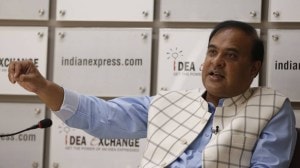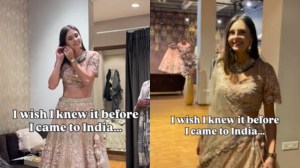Merry X’mas. No, sorry, Merry Winterval!
There are 196 families in the highrise building in which I live in central Mumbai, and none of them is Christian. Yet, when December arrived...

There are 196 families in the highrise building in which I live in central Mumbai, and none of them is Christian. Yet, when December arrived, the housing society put up a banner inviting families to participate in upcoming Christmas celebrations. Although I am opposed to proselytisation by Christian evangelists, I was happy to see kids buying decorative articles in neighbourhood shops for making the Christmas tree, hanging illuminated paper-stars outside their flats, and festooning the common area to welcome Santa. Thus, as in previous years, this 100% Hindu habitat will again celebrate Christmas with gaiety. Not as a religious event but as a cultural festival.
What’s so special about it, you may ask, when much of urban India, where Christians are a small minority, has taken to Christmas as one of its own festivals? It’s just that I am intrigued by what’s happening in Christian Europe, Christian America and Christian Australia. And it has a bearing on what we understand by secularism.
In most Christian-majority nations with recent non-Christian migrants, secularism has come to mean multi-culturalism, leading to steady erosion of their Christian heritage and national identity. Briefly put, multi-culturalism means: let diverse immigrant communities occupy their own separate and minority cultural spaces without expecting or attempting their integration into a common national culture. Thus, Birmingham in Britain renamed Christmas as ‘‘Winterval’’ (winter+festival), to make it ‘‘inclusive’’ for non-Christian immigrants. Luton cancelled its Christmas celebration, re-branding it as ‘‘Luminos’’. Sheffield calls its Christmas decorations ‘‘city lights’’. Some schools have re-christened Christmas holidays as winter holidays. Across Europe, church-going Christian population is declining. In contrast, there has been a visible rise in the number and religious solidarity of immigrants from West Asia. This, coupled with falling birth rates among native Europeans, has made many Christians fear that Europe will soon lose its identity by becoming ‘‘Eurabia’’.
The United States is awash with community debates and court cases on the role of Christianity in public spaces. For example, ultra-secularists have strongly objected to the public display of Ten Commandments in court houses, and the battle is far from over even after a divided Supreme Court ruling in July. Many workplaces have discouraged Christmas trees and decorations because of fears they might offend non-Christian employees.
In the name of multi-culturalism, ultra-secularists have sought to de-Christianise Australia. Left-leaning Australians disfavour public celebration of Christmas because ‘‘it’s not inclusive’’. Kuranda Seyit, director of the Forum on Australia’s Islamic Relations, told The Sunday Mail that ‘‘it’s time for Australia to fall in line with the UK, where councils have renamed Christmas as ‘Winterval’. Australia is now so diverse with so many cultures, we need to acknowledge the need to be inclusive of our identity.’’ Happily, another Muslim leader, Waleed Aly from the Islamic Council of Victoria, slammed the idea, saying, ‘‘Banishing the Christianity in Christmas is not multi-culturalism at all — it’s anti-culturalism’’. So intense is the debate that Australian Prime Minister John Howard was compelled to call for ‘‘religion to be put back into Christmas’’. He urged Australians to stop downplaying Christianity during Christmas, fearing it might offend non-Christians and atheists. ‘‘You don’t demonstrate tolerance towards minorities by apologising for your own heritage,’’ he said.
These developments provoke several questions. For example, does one become secular only by rejecting religion? Secularism teaches tolerance. But doesn’t ultra-secularists’ penchant for political correctness make them intolerant towards the majority community and its ethos? (In our own country, communists objected to Sarasvati Vandana during the NDA regime, even though its singing at education-related conferences was routine in Nehruji’s and Indiraji’s time.) Does a nation make its minorities feel insecure by preserving its identity, rooted largely in the heritage of its majority? In Russia, some Muslim bodies recently objected to the presence of the cross on Russia’s national emblem, calling it an ‘‘insult’’ to Muslim feelings since ‘‘it violates the secular nature of the state and doesn’t contribute to the unity of Russia’s peoples’’. If so, how many Muslim-majority nations entertain, in deference to secularism, similar questioning by its minorities regarding state symbols and public celebrations that are exclusively Islamic in nature?
We live in a world that’s becoming small and interdependent at a blinding pace. Every community is a majority somewhere and a minority from a different point of reference. No community is an island in itself and no faith is perfect. Every community’s and every nation’s spiritual and cultural space is being inter-penetrated by that of others. In times like these, every community and nation has a right (indeed, a duty) to preserve its own heritage, while being respectful towards others’ and receptive to the best in them. Diversity must be tolerated, even celebrated, but never at the cost of a unifying common culture, which is a precious fruit of a nation’s historical evolution. In this, India can offer some useful lessons to a world shaken by the forces of globalisation — provided we Indians overcome our own imperfections by learning from our common spiritual and cultural heritage. Above all, we should grasp the ennobling essence of every religion, and not quarrel over its symbolisms. To begin with, let every Indian celebrate Christmas, Eid and Diwali in the spirit of love, brotherhood and peace.
Write to sudheenkulkarniexpressindia.com
- 01
- 02
- 03
- 04
- 05































